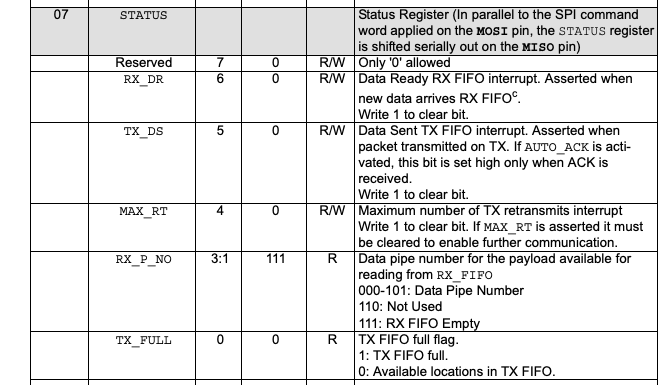So I'm sending multiple payloads of the same width from the transmitter to a receiver and I see it sends only sends 3 times after which TX_FULL bit is set in the status register, and the receiver gets 3 payloads.
Note I'm using IRQ on the TX side and no IRQ on the RX side (just polling). Also, I'm not using auto-ack.
What I don't get is how come TX fifo getting full at 3 bytes considering the tx fifo size is 32 bytes (status register has a value of
What I don't get is how come TX fifo getting full at 3 bytes considering the tx fifo size is 32 bytes. I also checked0x0f). I also checkedOBSERVE_TXregister and I see no lost bytes.OBSERVE_TXregister and I see no lost bytes. Is this the reason behind not receiving more than 3 bytes?
Note that I checked TX_FULL in the status register as it reads 0x0f while pushing to FIFO but as soon as I enable CE bit, I see the value reads 0x2E indicating TX_DS is set, and IRQ is triggered.
From what I have understood from the reference manual, you continue writing to the TX fifo but the transmission only begins after you enable the chip enable
From what I have understood from the reference manual, you continue writing to the TX fifo but the transmission only begins after you enable the chip enable(CE)bit and after you enableCE, the data is sent in first-in-first-out order as opposed to sending each byte right away as it gets stored into the FIFO?(CE)bit and after you enableCE, the data is sent in first-in-first-out order as opposed to sending each byte right away as it gets stored into the FIFO?
Following is what I did to transmit the payload: (for now I am polling despite using IRQ but eventually i'd be using callback functions to service the interrupt)
void send_payload(NRF *nrf, uint8_t *data, int len) {
power_up();
for (int i=0; i<len; i++) {
send_command(nrf, CMD_W_PAYLOAD, data[i], len); // populate the TX fifo with data
}
// enable transmission
enable_chip_select();
// wait till IRQ handler is done servicing
while(nrf->state == NRF_TX_BUSY);
disable_chip_select();
}

